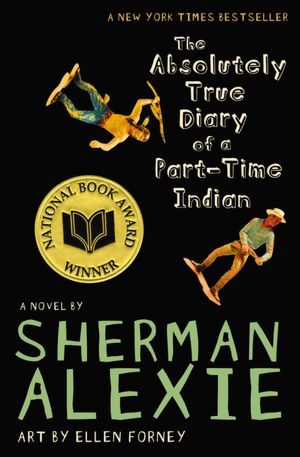I also celebrated Banned Books Week by listening to book number two on the 2012 list, The Absolutely True Diary of a Part-Time Indian by Sherman Alexie. The author himself read the book.
Statistics
Checkouts: audiobook not owned by either library
Typical reader: teens, Native Americans, fans of the author, fans of banned books
Source: my hometown library
Synopsis: Arnold "Junior" Spirit is a 14-year-old Spokane boy who lives on a reservation. At the encouragement of a teacher, he transfers to a better school 22 miles away, where the only non-Caucasian is its Indian mascot.
My Goodreads rating: 4 stars
Banned/challenged for: offensive language, racism, sexually explicit, unsuited for age group
This is a slice-of-life story of a teen boy who changes his own life by upsetting all norms of his tribe and going to a school off the "rez." It follows roughly a year of Junior's life, as he navigates his freshman year, friendships, racism and ostracism, loss, and basketball.
In listening to the audiobook version of this novel, I missed out on the art. However, I gained the hilarious narration of Mr. Alexie. I stuck the first CD in my car's player before I left the library parking lot, and proceeded to laugh all the way home. The humor is deadpan and dry, a lot of the time. But also, the voice the author uses for Junior's voice and internal monologue has an amazingly familiar accent. Apparently, a brain-damaged teen Spokane boy from a reservation in Washington State sounds like a Finlander Yooper. Seriously. He sounds like my dad's Uncle Reino. If you don't know what a thick Yooper accent sounds like, watch the movie Fargo and listen, particularly to the women in the bar ... or listen to this audiobook.
I loved this book. It covers a wide range of emotions and life experiences. Pretty much any teen could read it and recognize something for his or her life. It's humorous, and it also has plenty of hyperbole. Many of the stories remind me of American tall tales.
Does this book deserve its negative acclaim? Let's break it down.
- Offensive language. Everyone has a different definition of this. But yes, there is a sentence where a character not only drops the F-bomb, but also uses the N-word. It's a pretty knockout use, too, that really covers ...
- Racism. Yup. The sentence with the aforementioned words was definitely racist. And there's also racism between Native Americans and Caucasians. There's also a sort of racism within an ethnic people, as demonstrated by how other reservation inhabitants called Junior an "apple:" red on the outside, white on the inside. But it's intrinsic to the story. If everybody got along, if the US government had not discriminated against Native Americans and pushed many onto reservations, if ethnic groups did not stick together and create out-groups and outcasts, then maybe we wouldn't need stories that deal with racism. People that complain about racism in this book need a reality check.
- Sexually explicit. This isn't 50 Shades. The most Junior does with a girl is kiss. There are "gay" jokes. The most sexually explicit thing would have to be his admissions that he masturbates.
- Unsuited for age group. Because teens don't read about teens? Sure, it's not what you might want to hand to a child in elementary school, but that's not its intended audience. Teens are. And teens can and should read it, and they can and should handle the book just fine.
What did you read for Banned Books Week?

No comments:
Post a Comment